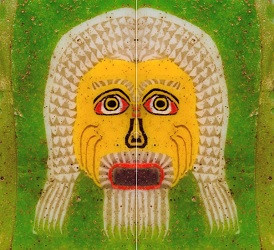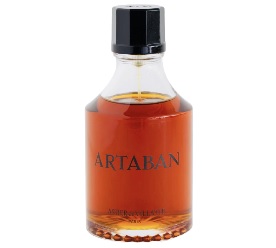
Hailed for the incredible lavishness of its formula, no less than twenty-four herbs imported at great expense from the most distant lands, this "royal perfume" was the idol of the wealthy Romans. They enthusiastically soaked themselves with it at every opportunity, as was the fashion of the time. Reinterpreted by Dominique Ropion, Artaban is a pure concentrate of the wonders of the plant universe. Delight in its fragrant scents - bitter and sweet marjoram, cardamom with a spicy fruity taste, nard with earthy, resinous and woody accords, and green and herbaceous calamus with multiple fragrant facets. — Astier de Villatte
Artaban, one of three fragrances in Astier de Villatte's Trois Parfums Historiques collection (the others are Les Nuits and Le Dieu Bleu), was inspired by a recipe recorded by Pliny the Elder of a lavish perfume created in Parthia (and used with gusto by ancient Romans). The perfume’s list of ingredients was long: ben nut juice and oil (extracted from the Moringa oleifera), wine, honey, costus, cinnamon, cardamom, mint, myrrh, cassia, styrax, labdanum (rockrose), balsam, aromatic reeds, fragrant rush from Syria, oenanthe (water parsley flower), henna, broom, opoponax, saffron, souchet (tiger nut), marjoram, lotos (the yellowish resin provided by a ferrule from Syria or the seed of the lotus from Egypt) and spikenard (also known as ‘nard’ or Indian lemongrass).
Ancient Romans went even further than today’s biggest buyer of perfume – Brazil. Not only did (rich) Romans douse themselves in fragrance, while they were at it they put perfume in comestibles and drinks, on their dogs, horses and birds (whose fluttering wings were yesteryear’s scent diffusers). Like us, Romans scented their homes and clothing, even their shoes. They liked to be “coated” in perfume.
Astier de Villatte Artaban seems a much simpler scent than the perfume of Parthian kings* and ancient Romans described above — what I smell bears little resemblance to the antique list of notes (the notes I've smelled, at least). I wore Artaban over the course of a week and noticed four distinct phases: pine/turpentine, an herbal, bitter/sour “daisy-smelling” note, loads of musky-sweet labdanum and a faded (but, shock, natural-smelling) patchouli in the extreme dry down. (Ropion mentioned in one article I read that patchouli is a stand-in for the nard used in the ancient formula.) Each time I wore Artaban, it smelled different as one of the above-mentioned scents/accords dominated (labdanum was “triumphant” most often).

Artaban’s opening is medicinal; top notes smell of tingly pine and cooling herbs (think all-natural muscle ointment for aches and pains). The herbal (and slightly floral) middle notes smell familiar — like many fragrance oils I’ve encountered at natural drug stores and street markets — elixirs made to scent the body, improve the mood, induce sleep or arouse your creativity (or libido). And those usually cost $20 or under, not $167-$285! In its next-to-last phase, which arrives within 15 minutes of application on my skin, Artaban feels heavy, with all-enveloping labdanum. Artaban becomes a pleasant, sweet patchouli skin scent within an hour of application (no one ever noticed I was wearing Artaban, even when I used 10 sprays of the perfume).
Next up, my final (and favorite) destination: ancient Egypt with Le Dieu Bleu.
Astier de Villatte Artaban Eau de Parfum is available in 30 ml ($167) or 100 ml ($285) spray bottles; a boxed discovery set with all three perfumes (Les Nuits, Artaban and Le Dieu Bleu) in 10 ml bottles includes an interesting informational booklet on the Trois Parfums Historiques project, $210.
As with all three historic perfumes, historian Annick Le Guérer was involved in Artaban's creation. I read her interesting commentary on the perfumes here.
Note: top image is Inlay, satyr Ptolemaic Period–Roman Period, 100 BC–100 AD, Theodore M. Davis Collection, Bequest of Theodore M. Davis, 1915 [doubled] via The Metropolitan Museum of Art, public domain.
* Possible origin of the "Artaban" name.
Hmm, sounds like this collection is a bit disappointing. When they were released I was also tempted to buy the coffret but the price scared me off. Now I’m happy I didn’t go for it. Hopefully you kept best for last 🤞 Thanks for the review Kevin. Reviews are my favourite posts here so I’m very grateful for the excellent writing and insights!
Thanks. The best will be last: Le Dieu Bleu. I was SOOOO tempted to get the $210 boxed set as well. Samples were just fine after all!
The ancient recipe sounds so good, the line seems really overpriced especially as you sound unimpressed so far.
Yes…that recipe sounds extravagant.
Well drat! I was hoping these would be amazing. If I want a pricey patchouli scent, I would go with Diptyque’s Tempo. Loved that one when I tested it.
SO MANY patchoulis out there — at reasonable prices.
I was sooooo excited for these – love the historic backstories and had high hopes given the people involved. Now I’m glad I didn’t pull the trigger. BTW hope to see more reviews from you, Kevin. You’re a wonderful, insightful writer.
Thanks, BalletBetz (and glad you didn’t pull the trigger).
Hi Kevin! I am a sucker for these high concept interpretations of ancient perfumes and have greatly enjoyed reading Tom Holland’s books on the Caesars and Rubicon so I’ll probably try them but sounds like a blind buy is not for me.
Thankfully, samples of these are available now. You’ll never be satisfied unless you sample them! Same with me.
This is supposed to have “nard” in it and it actually doesn’t..? I was excited to see a new spikenard / jatamansi perfume – they just used patchouli? Jatamansi oil is easily available but it does have very earthy, and pungent smell. I think they just chickened out.
Akimon — in one interview Ropion said nard’s use was restricted. I looked at IFRA’s fact sheet on the material and could not find such restrictions. The info on these three releases is confusing at times…or incomplete.
Interesting. I was not aware of this. If IFRA comes for my beloved spikenard, all bets are off. Thanks for checking!
What a fun and information-filled review. The fact that the perfume failed to excite hardly matters!
As I was reading your description, I was thinking of Yatagan–until I got to your “sweet patchouli skin scent within an hour of application” –my cheap as chips mood-swinger.
OF: I need to pull out the Yatagan before true warm weather arrives!